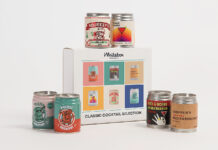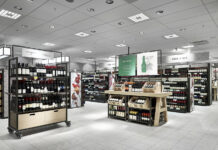The American Distilling Institute is thrilled that Dr. Anne Brock, master distiller of Bombay Sapphire and the former Grand Rectifier of the Gin Guild, will be the keynote speaker at ADI2022 in St. Louis, Missouri.
Before taking the helm at Bombay in 2017, she was the lead distiller at Bermondsey Gin, a craft producer based in London. That unique combination of experiences is one reason we’re so excited to hear from her in September.
As we look forward to ADI2022, we caught up with Dr. Brock to hear more about Bombay’s new sustainable certification, why she’s excited to have moved back to London, and how ADI conferences helped her career when she was just starting out.
As the pandemic ebbs, what now feels important to you, professionally and personally?
I used to live near my distillery in the countryside, and I live alone, so that was pretty tough. I didn’t know anyone in the surrounding area. My friends and family were in London or the Midlands, and I couldn’t see them. I only worked three days a week at the distillery.
I realized I could take a little step back, so I’ve moved back to London. That’s exciting personally and professionally. I don’t think you can be a distiller unless you know what’s going on in the bar and restaurant industry. London has such a fantastic cocktail scene, and now I can be out and about.
Professionally, it was interesting to not travel for a couple of years. I’m really grateful now to be back out in other countries and seeing what’s happening. It’s going to be interesting to keep an eye on the industry and what’s happening with smaller companies and whether it will have an impact on the explosion of craft distilling that’s happened over the past 10 years. And, equally, how much of our incredible hospitality industry will be able to bounce back.
Sustainability and conservation have long been one of your focus areas. What’s new on that front?
Recently we’ve been able to have all our botanical supplies certified sustainable by an external body called EcoCert. That was really important to us. It is a first for any global gin. We’ve been working on that for a long time.
How have supply chain challenges impacted your work?
The certification process was slowed down by the pandemic. That had less to do with the supply chain and more to do with accessing some of the countries. From a botanical sourcing perspective, it’s not a just in time process. It’s a slower, harvest-driven process. So there wasn’t too much of an impact on that side.
Where we’re struggling, and where the industry is struggling, is the packaging side–glass, cases, labels, and caps–and the shipping of goods as well. I think most companies run a just-in-time process, and just-in-time doesn’t work if the supply chain is not working.
How do you see the U.S. and U.K. distilling cultures influencing each other?
I’ve always thought that they do. Back when I was running a craft distillery, I would come to ADI. I think your craft distilling scene was more advanced, but it had a different focus. It was all rum and whiskey, whereas back in the U.K., we would start with gin. I always came back from the sessions at ADI having learned something and really having been inspired by hearing people talk about what they’re doing.
There are a couple of things in the States that are very different than in the United Kingdom. The first is physical space. There’s a lot more space in the United States. You can do a lot more grain to glass, whereas in the UK, we’re much more focused on NGS. Drinking cultures and habits are very different, with Tequila and whiskey being much more heavily focused on in the United States. Whereas in Europe, there is a Tequila movement, but it’s not as widespread.
You’ve been involved in a lot of new product development recently. What’s that process like?
We always talk about Bombay Sapphire being connected to the creative world, and we’ve translated that across to liquids in the last few years.
The most recent new product we’ve launched in Australia and the U.K, and I think it will be launched in the U.S. in the beginning of 2023, is called Bombay Sapphire Premier Cru. It’s a new expression of Bombay Sapphire that’s connected to Spain. We use Murcian lemons in Sapphire, and we’re highlighting a particular late harvest of fino lemons paired with mandarin and sweet navel orange. It’s perfect in a martini, which is one of my favorite cocktails. So I’m happy with it!
It can sometimes be quite daunting when you’re working on a new product. It’s all about looking for sources of inspiration. Is there a story you want to tell? A cocktail you want it to work in? For Bombay, we want to keep the core DNA so consumers can see that bright balance we have running through all innovations.
You work for quite a large company, but you’ve worked at a craft-scale producer as well. What are the parallels and differences between those two roles?
I think the clear parallel for small producers and my role now is the most important thing: making sure the liquid is high quality. That doesn’t change whether you’re making one or several thousand bottles a day.
At my small producer, I was the only distiller. I’ve now got a team I’ve got to trust, and who I do trust, but that was a big step for somebody who’s never worked with anyone else at a distillery before.
The other thing, when I was in the craft world, my support network was other small distillers. At Bombay, I have a support network of other master blenders and distillers within Bacardi. The great thing is that I still have connectivity with the small producers I used to work with, and we’d still help each other out. We’re such a supportive industry from that perspective.
I’m looking forward to being back in the United States. I’m really excited to hear what’s going on with other distillers and how people are coping. We haven’t had the opportunity to get together in a long time. The amount of information sharing that happens at ADI is great, and I’m really looking forward to it.








